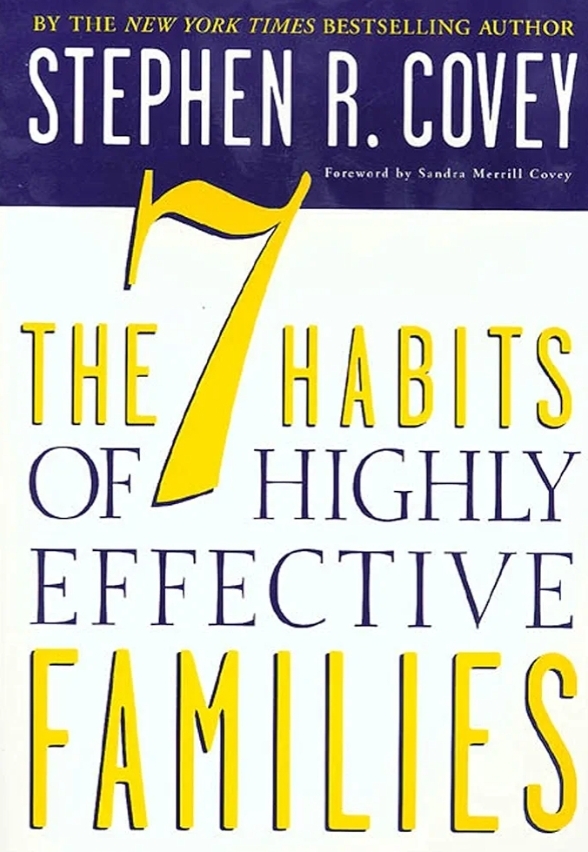“The 7 Habits of Highly Effective Families” by Stephen R. Covey takes the foundational principles from his best-selling book The 7 Habits of Highly Effective People and adapts them to family life. The book outlines how families can build strong, loving, and lasting relationships by applying timeless principles. Here’s a chapter-by-chapter breakdown of the original version in detail:
Part One: The Foundations of Family Effectiveness
Chapter 1: What Do You Want for Your Family?
- Covey begins with the big question: What vision do you have for your family?
- He introduces the need for a strong foundation based on trust, love, and shared purpose.
- Emphasis on the “emotional bank account” – making deposits (kindness, honesty, etc.) vs. withdrawals (breaking trust).
Chapter 2: Becoming an Agent of Change in Your Family
- Challenges the notion of being a victim of upbringing.
- Encourages parents and family members to be proactive and break negative cycles.
- Introduces the idea of becoming a transition person — someone who stops generational dysfunction.
Part Two: The Seven Habits and the Family
Habit 1: Be Proactive
Chapter 3: First Create the Family in Your Mind
- Teaches that families can choose their responses to challenges.
- Emphasizes responsibility, initiative, and setting the tone in family culture.
Habit 2: Begin with the End in Mind
Chapter 4: Create a Clear Family Mission Statement
- Encourages families to write a mission statement together.
- This becomes the compass for decision-making, goals, and values.
- Promotes unity and clarity.
Habit 3: Put First Things First
Chapter 5: Family Time: Putting It Where It Belongs
- Stresses the importance of prioritizing family over work, distractions, or entertainment.
- Introduces tools like family meetings, family dinners, and scheduled one-on-one time.
- Urges readers to align daily actions with long-term values.
Habit 4: Think Win-Win
Chapter 6: Moving from “Me” to “We”
- Encourages cooperation rather than competition among family members.
- Shows how to resolve conflicts by finding mutually beneficial solutions.
- Promotes empathy, fairness, and shared decision-making.
Habit 5: Seek First to Understand, Then to Be Understood
Chapter 7: Communication Is the Key
- Emphasizes empathetic listening in families, especially between parents and children.
- Demonstrates how seeking first to understand defuses arguments and builds connection.
- Also teaches assertiveness – expressing your own needs without dismissing others’.
Habit 6: Synergize
Chapter 8: Building Family Unity Through Teamwork
- Shows how valuing differences (ages, personalities, roles) builds strength.
- Promotes solving problems together rather than individually.
- Synergy means the whole is greater than the sum of its parts.
Habit 7: Sharpen the Saw
Chapter 9: Renewing the Family Spirit
- Encourages regular renewal in four areas: physical, spiritual, mental, and social/emotional.
- Gives ideas for family traditions, shared learning, and recreation.
- Importance of forgiveness, fun, spiritual grounding, and growth.
Part Three: Applying the Habits to Tough Family Challenges
Chapter 10: Resolving Family Conflicts
- Offers practical steps for dealing with recurring problems and emotional wounds.
- Uses the habits (especially Habits 4, 5, and 6) to build lasting peace.
Chapter 11: Raising Responsible, Caring Children
- Applies proactive principles to parenting.
- Covers discipline, modeling, consequences, and building internal motivation in kids.
Chapter 12: Creating a Family Culture in a Turbulent World
- Explores how to counteract negative cultural influences (media, peer pressure, etc.).
- Empowers families to shape their own identity and values rather than conform.
Conclusion: The Power of a Family
- Covey leaves readers with the message that families are the most influential institutions on earth.
- He encourages building legacy, love, and leadership within the home.
FAMILY MISSION STATEMENT TEMPLATE
Step 1: Discuss Together
Gather your family and talk through the following questions. Let everyone share.
- What is most important to us as a family?
- What values do we want to live by?
- What kind of feeling do we want in our home?
- What principles do we want to guide how we treat each other?
- What kind of legacy do we want to leave?
Step 2: Brainstorm Core Values
Pick a few values that reflect what your family stands for. Here are some examples:
- Love
- Respect
- Kindness
- Hard work
- Honesty
- Faith
- Learning
- Gratitude
- Humor
- Service
Step 3: Write It Out
Here’s a simple formula to follow:
“We, the [Last Name] family, commit to building a home filled with [value 1], [value 2], and [value 3]. We treat each other with [principle]. We grow together through [activities, traditions, learning, etc.]. We strive to [mission or goal].”
Example Mission Statement:
“We, the Ramirez family, commit to building a home filled with love, honesty, and fun. We treat each other with kindness and respect. We grow together by eating dinner together, praying, learning, and laughing often. We strive to help others and make the world a little better each day.”
BONUS: Habit 1 – Be Proactive Family Activity
Name of Activity: “Response-Ability” Jar
What You Need:
- A jar
- Small slips of paper
- Pen or marker
How It Works:
- Each family member writes one or two difficult situations on slips of paper (e.g., “someone took my toy,” “I got a bad grade,” “my sibling made me mad”).
- Fold and place them in the jar.
- Take turns drawing one, reading it out loud, and discussing two responses:
- Reactive response (blaming, yelling, quitting)
- Proactive response (pausing, thinking, choosing a better action)
Goal:
Practice recognizing your power to choose your response. It’s not what happens to you but how you respond that matters.







